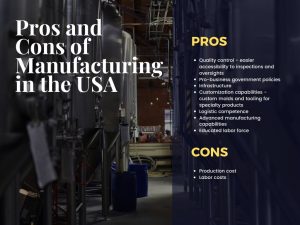During my almost 30-year career as a foreign correspondent for the Chicago Tribune, about one-third of the stories I produced had to do with business–specifically, international business. I wrote a lot about the theft of intellectual property rights and American competitiveness–or the lack thereof.
I witnessed the hollowing out of many American industries as companies moved their manufacturing operations to places like China, Vietnam, Bangladesh, Indonesia, etc. While such moves usually meant lower labor costs, those companies were also at the mercy of erratic labor laws, political instability, currency fluctuation, logistical issues, and the unfettered theft of intellectual property.
In his commentary that follows, Mike Ford, managing editor of the American Free News Network, to which I am a contributor, discusses the flaw inherent in moving one’s operations from the United States to another country. He says the America Premium is worth considering before you move your company overseas. What is the America Premium? Read on:
The America Premium
by Mike Ford
There seems to be a common belief, mostly on the left, that businesses take their operations overseas merely for the cheap labor and the Wild Wild West of unregulated factory production and no EPA constraints. Actually, it’s not quite that simple. Cost of labor and regulation, although huge considerations aren’t the only things companies consider before leaving the United States or, on the other hand, choosing to come/remain here.
I’m talking about “The America Premium.” The America Premium is the amount of taxation and regulation—the amount of added costs and operational burden a business is willing to tolerate in order to benefit from two things that the United States does better than anywhere else: Rule of Law and Property Rights.
Some time back, a member of my loyal readership made an interesting comment. JohnCV wrote (emphasis, mine):
“If you read the DI [Declaration of Independence] and Constitution in the context of the events leading up to the Revolution, the issue of Property is enormous, central even. The Colonies were effectively run as a reward system for the Crown where land grants (and Governorships) were given and taken back as allegiances and friendships changed. Imagine carving a thriving business out of thousands of acres of wilderness, establishing your family and community, and then having it taken away from you because King George has a new BFF. This happened. Regularly.”
JohnCV was spot on. Rule of Law. Property Rights. Both of those are necessary for a robust economy in a constitutional republic. After all, who would want to do business in a country that, at any point, with the stroke of a pen, “nationalizes” your entire business? As he pointed out above, you put your heart and soul into creating something to feed you and your family and perhaps leave a small legacy for your progeny, then on a whim or to or to appease the masses, some tinpot leftist like Hugo Chavez or Bernie Sanders takes everything you have. If he’s smart, he forces you to run it for a pittance until he appoints some of his cronies to come in and run it completely into the ground, sort of like the Mustang Ranch.

That is what companies are trying to avoid when they pay U.S. tax rates and shoulder the burden of U.S. regulations. So why do some companies decide to offshore their supply chain? Simple—cost-benefit-risk.
In a previous series I did on trade, I interviewed one such CEO/Owner. His assessment was pretty simple, although somewhat subjective in the end. He asked himself:
“Is what I’m paying for the America Premium worth the savings I’ll get by offshoring, and is the risk I take by abandoning U.S. rule of law and property rights worth it?”
Successful businessmen aren’t stupid. The good ones understand the difference between tactical monetary gain and strategic financial success. The good news is that companies, all things being equal, would really rather be domiciled in the U.S. They just don’t wish to overpay for the privilege. Leftist politicians like Joe Biden appear to believe that there is no limit they can charge for a diminishing America Premium. They then decry business owners/CEOs who make the quite logical decision to move to more amenable climes.
The way to encourage them to come back is to put the America Premium back on permanent sale. President Trump did just that with the elimination of unnecessary and costly regulations while easing the corporate tax burden. The repatriation of overseas corporate profits was a good start, as was his regulatory repeal initiative, which has now repealed four regulations for each new one. President Trump had started to get some real traction, with companies abandoning China in droves. Then came a stolen election and Joe Biden, who, via executive fiat, began to reverse everything President Trump had done.
The comparison between President Trump’s economic successes and Joe Biden’s attempt to replicate Venezuela is proof positive that the American Premium is well worth paying for. But, like anything else, it can be overpriced.

Mike Ford~ is the Managing Editor of the American Free News Network. He is a retired Infantry Officer who writes mainly on Military and Foreign Policy while occasionally dabbling in Political and Economic matters. Ford has widespread experience, ranging from military to local law enforcement, and developing technology solutions for special operations applications. He also does occasional consulting work for local and state governments along with private industry.
[If you enjoyed this post, please consider subscribing to ForeignCorrespondent and tell your friends to subscribe. IT’S FREE! WHAT A DEAL! If you’ve received this from a friend and would like to be added to our distribution list for future blog posts, please enter your email address in the sign-up for notifications box at https://ronaldyatesbooks.com/category/foreign-correspondent. You can also find my commentaries on the American Free News Network at https://afnn.us. And please feel free to comment. WE LOVE COMMENTS!]

